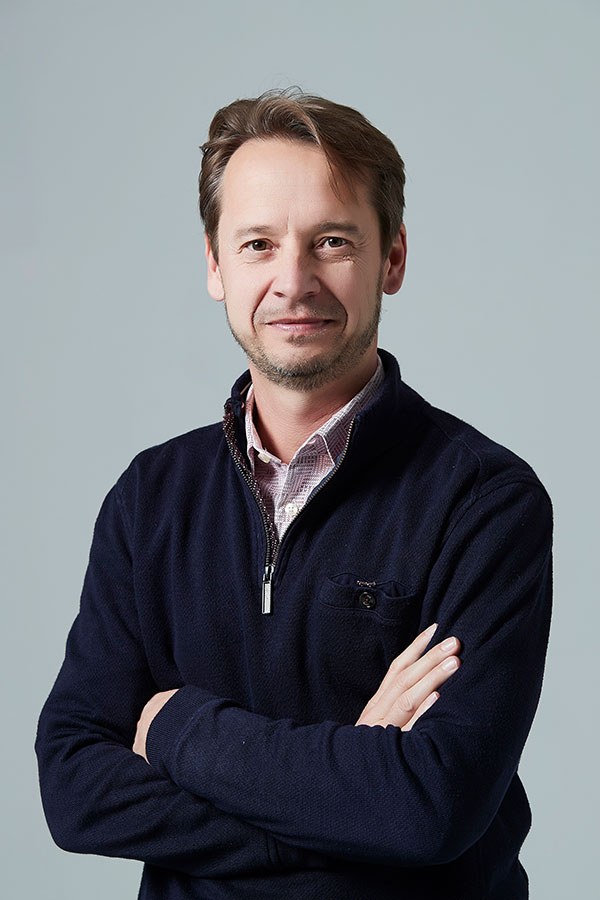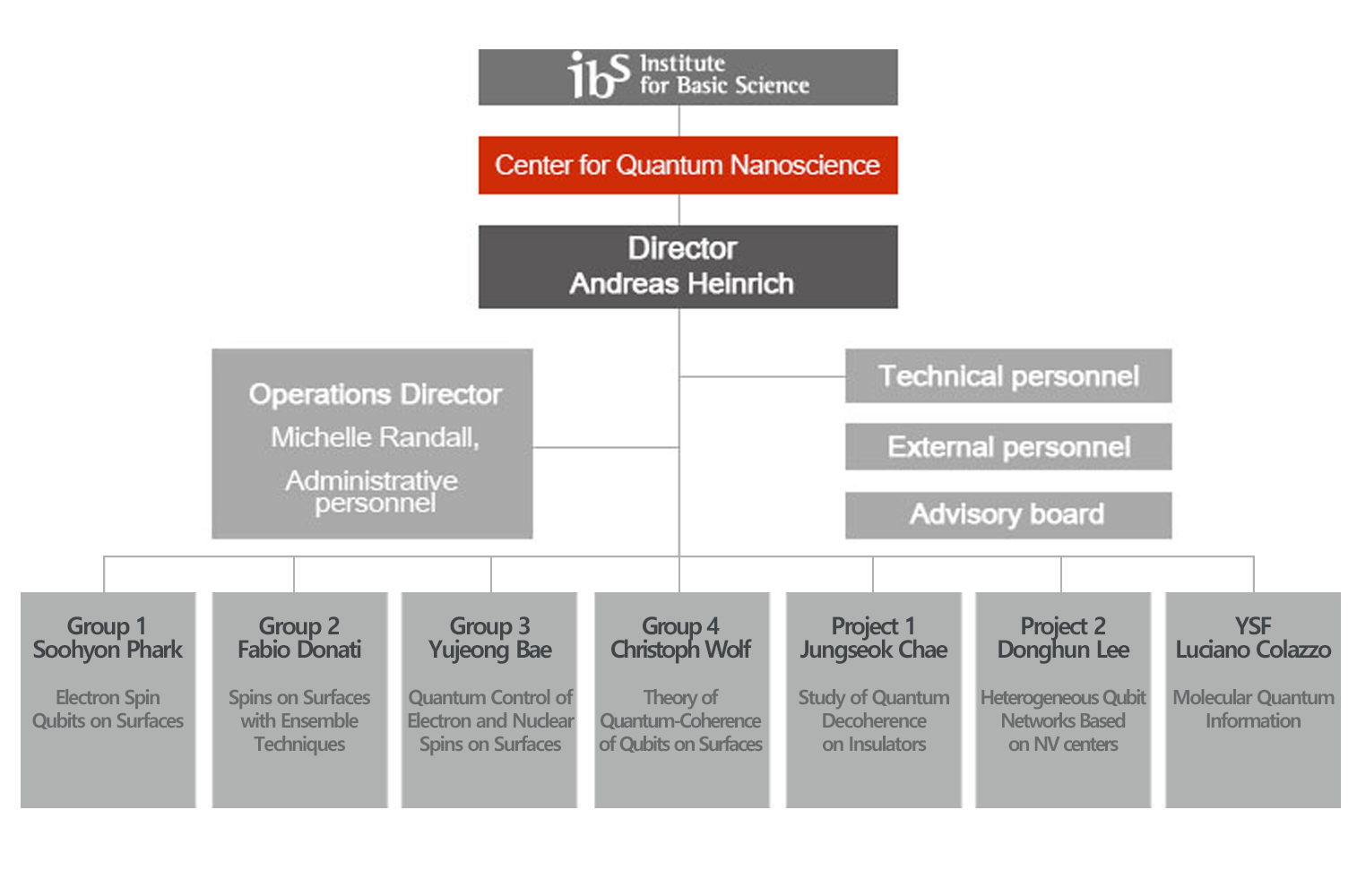주메뉴
- About IBS 연구원소개
-
Research Centers
연구단소개
- Research Outcomes
- Mathematics
- Physics
- Center for Underground Physics
- Center for Theoretical Physics of the Universe (Particle Theory and Cosmology Group)
- Center for Theoretical Physics of the Universe (Cosmology, Gravity and Astroparticle Physics Group)
- Dark Matter Axion Group
- Center for Artificial Low Dimensional Electronic Systems
- Center for Theoretical Physics of Complex Systems
- Center for Quantum Nanoscience
- Center for Exotic Nuclear Studies
- Center for Van der Waals Quantum Solids
- Center for Relativistic Laser Science
- Chemistry
- Life Sciences
- Earth Science
- Interdisciplinary
- Center for Neuroscience Imaging Research (Neuro Technology Group)
- Center for Neuroscience Imaging Research (Cognitive and Computational Neuroscience Group)
- Center for Algorithmic and Robotized Synthesis
- Center for Nanomedicine
- Center for Biomolecular and Cellular Structure
- Center for 2D Quantum Heterostructures
- Institutes
- Korea Virus Research Institute
- News Center 뉴스 센터
- Career 인재초빙
- Living in Korea IBS School-UST
- IBS School 윤리경영


주메뉴
- About IBS
-
Research Centers
- Research Outcomes
- Mathematics
- Physics
- Center for Underground Physics
- Center for Theoretical Physics of the Universe (Particle Theory and Cosmology Group)
- Center for Theoretical Physics of the Universe (Cosmology, Gravity and Astroparticle Physics Group)
- Dark Matter Axion Group
- Center for Artificial Low Dimensional Electronic Systems
- Center for Theoretical Physics of Complex Systems
- Center for Quantum Nanoscience
- Center for Exotic Nuclear Studies
- Center for Van der Waals Quantum Solids
- Center for Relativistic Laser Science
- Chemistry
- Life Sciences
- Earth Science
- Interdisciplinary
- Center for Neuroscience Imaging Research (Neuro Technology Group)
- Center for Neuroscience Imaging Research (Cognitive and Computational Neuroscience Group)
- Center for Algorithmic and Robotized Synthesis
- Center for Nanomedicine
- Center for Biomolecular and Cellular Structure
- Center for 2D Quantum Heterostructures
- Institutes
- Korea Virus Research Institute
- News Center
- Career
- Living in Korea
- IBS School
Research Centers
- Research Outcomes
- Mathematics
- Physics
- Center for Underground Physics
- Center for Theoretical Physics of the Universe (Particle Theory and Cosmology Group)
- Center for Theoretical Physics of the Universe (Cosmology, Gravity and Astroparticle Physics Group)
- Dark Matter Axion Group
- Center for Artificial Low Dimensional Electronic Systems
- Center for Theoretical Physics of Complex Systems
- Center for Quantum Nanoscience
- Center for Exotic Nuclear Studies
- Center for Van der Waals Quantum Solids
- Center for Relativistic Laser Science
- Chemistry
- Life Sciences
- Earth Science
- Interdisciplinary
- Center for Neuroscience Imaging Research (Neuro Technology Group)
- Center for Neuroscience Imaging Research (Cognitive and Computational Neuroscience Group)
- Center for Algorithmic and Robotized Synthesis
- Center for Nanomedicine
- Center for Biomolecular and Cellular Structure
- Center for 2D Quantum Heterostructures
- Institutes
- Korea Virus Research Institute
Engineering the quantum future by conducting quantum-coherent nanoscience research that is laying the foundation for future quantum technologies through exploring the use of quantum behavior of atoms and molecules on surfaces with highest precision.
Tel. +82-2-3277-4743
IBS Center for Quantum Nanoscience, Research Cooperation Building, Ewha Womans University, 52 Ewhayeodae-gil, Daehyeon-dong, (2-181, Sinchon-dong) Seodaemun-gu 03760 Seoul, Republic of Korea
Director

Director Andreas HEINRICH
With more than 20 years of research experience in nanoscience, HEINRICH is the world leader in the study of the quantum properties of atoms on surfaces. He is a pioneer in advancing the capabilities of his primary research tool, the Scanning Tunneling Microscopy (STM), which offers the unique ability to image individual atoms, position them with atomic-scale precision and measure their electronic states. One of HEINRICH's ambitious long-term goals is to investigate whether quantum computing with atoms on surfaces is possible.
Professor HEINRICH is the director of the Center for Quantum Nanoscience, which was established in January, 2017 at EWHA Womans University in Seoul. Andreas HEINRICH received his Ph.D. from University of Goettingen in Germany in 1998 after which he moved to IBM research in San Jose, USA as a postdoc. At IBM he quickly advanced to lead a research team, which has produced outstanding scientific results as well as great success with outreach to the general public.
Introduction
The Center for Quantum Nanoscience (QNS) at Ewha Womans University focuses on the exploration of the intersection of quantum science and Nanoscience. Quantum nanoscience is a rather broad field, encompassing many research areas including quantum materials, molecular magnetism, and the theory of open quantum systems. While all of nanoscience is intrinsically governed by quantum mechanics, the explicit use of the phenomena based on quantum-coherence such as superposition and entanglement has been rather limited to date.
QNS has a cutting-edge effort in quantum-coherent nanoscience and a complementary effort in quantum materials. The research field of quantum-coherent nanoscience is broad and encompasses work in molecular magnetism, point defects in insulators, dopants in semiconductors and much more. In a relatively short time, QNS has established itself as one of the leading players in quantum-coherent nanoscience, studying the quantum-coherent properties of atomic and molecular spins on well-defined surfaces. QNS’s host institution, Ewha Womans University, built a top-notch research building, fully customized to the needs of QNS’s research and has the lowest vibration levels in Korea and among the best in the world.
"Main research activities"
- - Exploring the quantum coherent manipulation of nanostructures on surfaces
- - Exploring and developing the use of single atoms and molecules as quantum bits for quantum computation using a ‘bottom-up approach’
- - Extending the achievement of full control of the quantum states to diverse atoms and molecules on clean surfaces and near interfaces in a variety of systems
- - Pioneering new techniques and developing equipment in the pursuit of these goals
"Major research outcomes"
- - World’s most stable single-atom magnets on surfaces consisting of dysprosium or holmium atoms
- - Electron spin resonance in scanning tunneling microscopy of single atomic and molecular spins on a surface
- - Electron-nuclear hyperfine interaction of individual atoms on a surface
- - Pulsed spin resonance of single qubits on a surface
- - Theory and experiment of double resonance spectroscopy of two coupled spins on a surface
Organization

Main research results
- Electron spin resonance of single iron phthalocyanine molecules and role of their non-localized spins in magnetic interactions
(Nature Chemistry, 2022) - Coherent Spin Control of Single Molecules on a Surface
(ACS Nano, 2021) - Mapping Orbital-Resolved Magnetism in Single Lanthanide Atoms
(ACS Nano, 2021) - Engineering atomic-scale magnetic fields by dysprosium single atom magnets
(Nature Communications, 2021) - Hyperfine interaction of individual atoms on a surface
(Science, 2018)
Personnel
| Total | 48 |
|---|---|
| Gender | 20(Male), 28(Female) |
| Korean/ International | 29(Korean), 19(International) |
Degree
Position
As of April. 2022
- Content Manager
- Center for Quantum Nanoscience : KIM sun hee 02-3277-4741
- Last Update 2025-05-14 10:46












